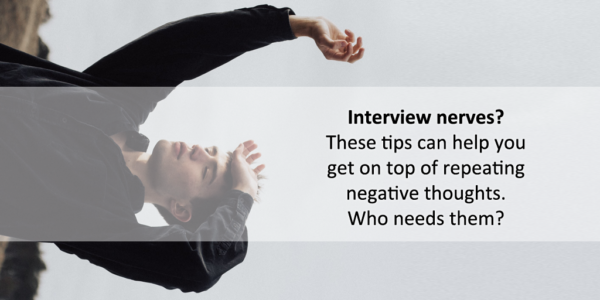Do you get anxious about job interviews? These 3 self-help CBT techniques will help to calm your interview nerves. Bad thoughts can play over and over again like a stuck record. You can break that pattern.
What is CBT? How can it help with job interview anxiety?
CBT stands for Cognitive Behavioural Therapy. It helps you become more aware of negative thoughts you may be having so you can see how they affect your mood and actions. It then helps you pause and move away from those negative thoughts so they stop affecting how you feel.
“Your performance is influenced by what you think you can and can’t do. While we can’t stop our thoughts, we can change how we choose to then respond to them.”
– Lauren Povey, CBT therapist
If you get butterflies before, during and after job interviews it’s a very natural thing to happen but you don’t want it getting out of hand. These self-help tips from Lauren can help you get back on track if you start feeling anxiety.
1. Recognise negative thoughts. Gotcha. Shape them into positive thoughts instead.
Before and after your job interview, take time to write down moments when you felt anxious about it. Take a moment to remember what you thought, how you felt and how you went on to behave:
- What caused you to become anxious? Did you struggle to get your words out? Was it when you were looking over your CV?
- What did you think at the time? Were you convinced you wouldn’t do a good job or that your interviewers would judge you?
- What will happen if you continue to think this way? Will your anxiety lead you to behave nervously in future interviews? Will it have an effect on your career?
- Challenge the initial thoughts you had at the time. You know you’re well-prepared. You meet the job description requirements and have lots of examples to show your experience.
- Look at a healthier way of thinking about the situation. You may want to think: “This is an exciting opportunity and I’m going to try my hardest to show that I’m a good candidate for the role.”
- Write down an affirmation. An affirmation is a positive encouraging statement to yourself. An example affirmation might be: “I am skilled, experienced and deserve this opportunity.”
- Put an action plan in place. Make a conscious effort not to dwell on negative thoughts the next time they crop up. When you feel them building up, focus on your experience and skills instead.
Once you have had a few goes in this technique, you’ll be able to redirect yourself away from negative thoughts quickly so that they don’t distract you during the interview process.
2. Visualise your success rather than your failure
In the lead-up to a job interview, visualise it going perfectly. This will act as a non-verbal instruction, training your body to act confidently in moments where you might have felt anxiety before.
How to visualise your interview success:
- Find a private, calm space and make yourself comfortable
- Take a few slow and deep breaths to calm yourself
- Close your eyes
- Set the scene – make it feel like you’re really there. What building will you be in? What will you be wearing? Who will you be speaking to? If you are worried about a particular question, imagine yourself answering it perfectly and confidently. If you are concerned about appearing nervous in front of people, imagine yourself poised, relaxed and focused
- Remain in the moment for 5 to 10 minutes or until you feel relaxed
Whenever a negative thought appears or you start to feel nervous, return to this place to remind yourself of your abilities, and to calm down.
3. Swap your negative inner dialogue for positive self-talk
Anxiety can cause you to focus on all the mistakes you could possibly make and believe that the worst will happen. Swapping this for positive self-talk can prevent these thoughts from intensifying to such a level that they affect your mood and what you do before, during and after your job interview.
- Before – before the job interview, say things like: “It’s going to be tough but worth it” or “I’m going to do as well as I possibly can”. You can say the statements out loud in a safe place where people can’t hear you, or just tell them to yourself silently.
- During – stay positive throughout the interview. Think positive statements like: “Concentrate on what is going on, not on how you feel”, “I know these nerves will pass” or “I know I’ll be fine”
- After – remember to give yourself praise afterwards. Tell yourself things like “I’m really pleased with myself” or “I really got my message across well”
Even when things don’t go exactly to plan, you should take the time to review what you remember, how you felt, what you said and did. This will help you recognise negative thoughts so you can start shaping them into positive thoughts (see step 1). Every small step you make is progress to feeling more calm and less anxious in future interviews.
Know when to get help for anxiety
It’s always important to take care of your mental health on an everyday basis, and anxiety is part of that. If you ever feel like your anxiety is becoming more persistent and is having a negative effect on your everyday life, it is important to visit your doctor. They will be able to see if you need any further professional treatment.
Our thanks go to Lauren Povey for the useful tips in this self-help guide. She is a CBT therapist who helps people with anxiety at Priory Hospital Chelmsford. So she knows all about helping people with anxiety through CBT!













